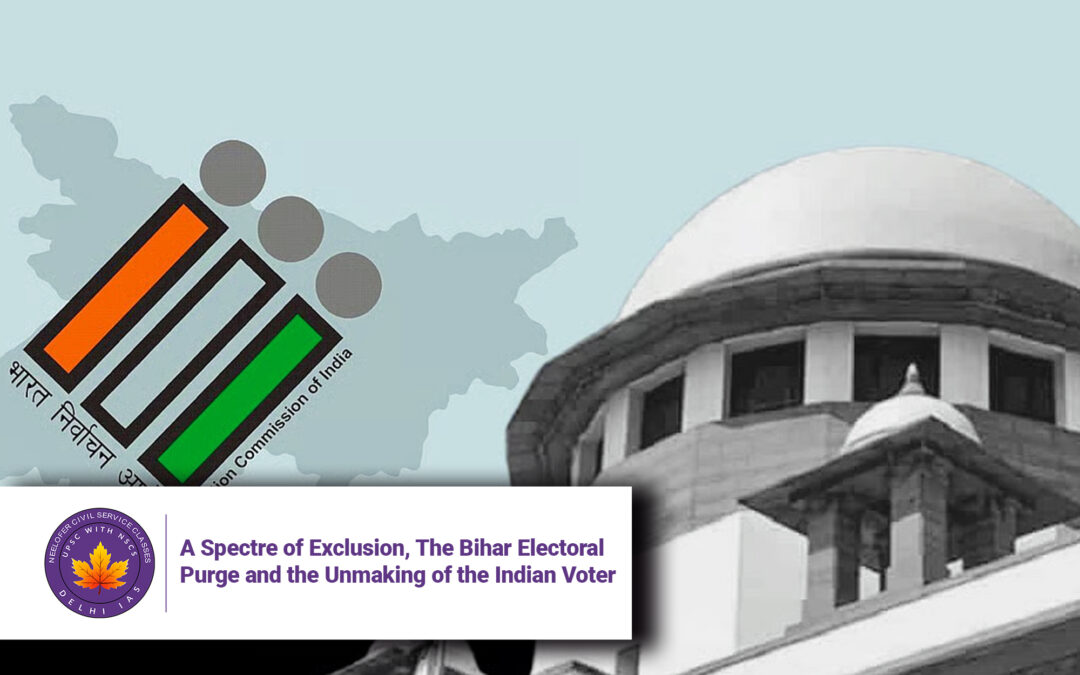A Spectre of Exclusion, The Bihar Electoral Purge and the Unmaking of the Indian Voter
Introduction: The Silent Disenfranchisement of Millions
In the world’s largest democracy, the right to vote is the foundational covenant between the citizen and the state. It is the sacred promise that every voice, however humble, has an equal weight in shaping the nation’s destiny. This promise now stands broken in Bihar. The Special Intensive Revision (SIR) of the electoral rolls initiated by the Election Commission of India (ECI) in June 2025 has resulted in a seismic event: the summary exclusion of 6.5 million voters from the electoral rolls on the eve of crucial state assembly elections.
This is not a routine administrative clean-up. It is a mass disenfranchisement of a scale unprecedented in independent India’s history. Overnight, millions of Indian citizens have been rendered political non-entities, their constitutional right to adult suffrage extinguished by bureaucratic fiat. This act strikes at the very heart of India’s democratic soul, invoking the darkest fears of the nation’s founders and raising a terrifying spectre of exclusion that threatens to redefine the Indian republic not as a democracy of the people, but as a democracy of the select.
The Constitutional Promise: A Legacy of Inclusivity
To understand the gravity of this event, one must return to the foundational debates of the Constituent Assembly. The framers of the Indian Constitution, having witnessed the horrors of partition and the perils of majoritarian impulses, were obsessively careful about safeguarding the franchise.
Dr. B.R. Ambedkar, the principal architect of the Constitution, was unequivocal. He declared, “Franchise is the most fundamental thing in a democracy,” warning that the exclusion of any entitled person “as a result of the prejudice of local government, or the whim of an officer… would cut at the very root of democratic government.” For Ambedkar, the creation of a centralized, independent Election Commission under Article 324 was the institutional antidote to this very threat—a body designed to shield the electoral process from the corrosive interference of the executive.
Other visionaries echoed his concerns. Shibban Lal Saxena expressed deep scepticism about the Commission’s independence, insisting its appointees must enjoy the confidence of “all parties.” K.M. Munshi warned that corrupt practices could emanate not just from candidates, but from the government of the day itself. Naziruddin Ahmad presciently feared a future where a ruling party’s impatience with criticism would lead to the suppression of opposition, jesting that such a state would be an “undemocratic, sovereign republic.”
The collective wisdom that birthed Article 326 was clear: the right to vote for every adult citizen was non-negotiable, the bedrock upon which everything else was built. The SIR in Bihar represents a wholesale violation of this sacred compact.
The Bihar SIR: Procedure Over People, Power Over Principle
The Election Commission’s justification for the SIR hinges on the need for a de novo (completely new) revision to purge the rolls of “ineligible” voters—the deceased, those who have permanently shifted, and duplicate entries. On the surface, this is a laudable goal. Accurate rolls are essential for a fair poll.
However, the devil, as always, is in the undemocratic details:
-
The Scale and Timing: The removal of 6.5 million names—a number larger than the population of many countries—just months before a high-stakes election is inherently destabilizing and suspicious. It creates administrative chaos and undermines public confidence in the electoral process itself.
-
The Opaque Process: The initial refusal of the ECI to provide a full and public account of the deletions, including the names and specific reasons for each exclusion, reeked of secrecy. Democracy demands sunlight; this process was shrouded in shadow. It was only after a landmark intervention by the Supreme Court that the ECI was forced to disclose this information publicly.
-
The Lack of Due Process: The principles of natural justice demand that a person must be heard before a right is taken away. There is little evidence to suggest that millions of voters were given adequate individual notice and a meaningful opportunity to contest their removal before their names were struck off. This is administration by bulldozer, not by the scalpel of justice.
-
The Spectre of Bias: In a politically charged atmosphere, the massive removal of voters from a state with a complex social demographic inevitably raises questions of motive. When the executive, led by the BJP, has been widely accused of weaponizing state institutions, the ECI’s actions are viewed not as neutral housekeeping but as a targeted political operation.
The Ghost of Ambedkar: A Prophecy Fulfilled
The events in Bihar are a chillingly precise fulfilment of the fears articulated in the Constituent Assembly over seven decades ago.
Ambedkar’s Warning: His warning against the “prejudice of local government” and the “whim of an officer” has come to life. The SIR, whether by design or consequence, operates as a powerful whim on a colossal scale, disenfranchising citizens based on a process vulnerable to local biases and political pressure.
Munshi’s Fear: The “corrupt practice by the government of the day” that Munshi warned of is now visible in the alleged use of the state machinery to create a climate of fear and the potential use of the electoral machinery to tilt the playing field.
Ahmad’s Prediction: The “impatience” with opposition that Ahmad described now defines Indian politics. The ruling party’s behaviour inside and outside Parliament—mocking dissent, using investigative agencies to target opponents, and dominating the airwaves—creates the ecosystem where an act of mass disenfranchisement is not just possible but is defended.
Ambedkar’s definitive vision of democracy stands in stark contrast to the current reality: “democracy does not mean a police state… It does not mean a totalitarian state where one party can seize power and keep opposition parties suppressed… It can not mean a society or state where an individual is made a robot or where they are reduced to a small screw in the big machine of the state.” The reduction of 6.5 million voters to mere cogs, easily discarded, is the ultimate reduction of the citizen to a screw.
The Larger Pattern: From Democratic State to Police State
The Bihar SIR cannot be viewed in isolation. It is the logical culmination of a decade-long project to hollow out India’s democratic institutions and consolidate power.
-
Weaponized Agencies: Central investigating agencies (CBI, ED, IT) have been relentlessly deployed against opposition leaders, activists, and dissenting voices, creating a culture of intimidation.
-
Executive Overreach: There has been continuous and brazen interference in the functioning of autonomous institutions—from the ECI and the judiciary to universities and the media—eroding their independence and reducing them to extensions of the ruling party.
-
The Silence of the Institutions: The systematic weakening of these bodies has made them complicit, or at least passive, in the face of actions that undermine constitutional morality.
The SIR is the application of this playbook to the most fundamental process of all: the election itself. If you cannot win over the voters, the solution is to simply remove them from the list.
Conclusion: Reclaiming the Republic
The exclusion of 6.5 million voters in Bihar is a five-alarm fire for Indian democracy. It is a moment of profound constitutional crisis. The ideals of the freedom struggle and the meticulous wisdom of the Constituent Assembly are being dismantled brick by brick.
The Supreme Court’s intervention to mandate transparency is a crucial first step, but it is not enough. The responsibility now lies with:
-
The Opposition: To unite beyond partisan interests and fight for the fundamental right of every citizen to vote.
-
The Civil Society and Media: To act as vigilant watchdogs, investigating each wrongful deletion and holding power to account.
-
The Judiciary: To go beyond procedural directives and deliver a robust judgment that reaffirms the inviolability of the franchise and places stringent checks on the ECI’s power to disenfranchise.
-
The People: To recognize that the disenfranchisement of even a single legitimate voter is an attack on the sovereignty of every citizen.
The spirit of the Constitution, so passionately debated and carefully enshrined, calls for a fierce defence. The alternative, as the founders warned, is not just an electoral loss for one party, but the loss of India’s soul as a democratic republic. The spectre of exclusion must be confronted before it becomes the new normal.
5 Q&A on the Bihar Electoral Roll Crisis
Q1: What is a Special Intensive Revision (SIR) and how is it different from a normal revision of electoral rolls?
A1: A normal summary revision is an annual process where the existing electoral roll is updated. New voters are added, and names of the deceased or those who have permanently moved are removed based on verifiable data. A Special Intensive Revision (SIR), however, is an extraordinary exercise ordered under Section 22(1) of the Representation of the People Act, 1950. It is a de novo (completely new) house-to-house verification process meant to completely re-enroll every voter. While intended for areas where the roll is deemed severely flawed, its use on a massive scale just before an election is highly disruptive and prone to error and misuse.
Q2: What was the Supreme Court’s role in this matter?
A2: The Supreme Court played a critical role in upholding transparency. It issued a landmark interim order directing the Election Commission to publicly disclose the names and specific reasons for the exclusion of all 6.5 million voters. The Court mandated that this list be published through multiple platforms—government notices, newspapers, radio, and official websites—within 48 hours. This was to ensure that no genuine voter is disenfranchised without notice and to provide them an opportunity to appeal their removal.
Q3: Didn’t the ECI have the right to clean the rolls of bogus voters?
A3: Yes, the ECI has both the right and the duty to maintain accurate electoral rolls. However, this duty must be exercised with utmost caution, transparency, and in accordance with principles of natural justice. The problem is not the intent to clean the rolls, but the opaque, non-consultative, and massively scaled process employed. The lack of due process—where millions were stripped of their voting rights without adequate prior individual notice or a fair hearing—transforms an administrative exercise into an arbitrary act of disenfranchisement.
Q4: How does this event connect to the wider fears of India’s founding fathers?
A4: The founding fathers, especially Dr. Ambedkar, specifically feared that the executive could use its power to manipulate electoral rolls and exclude undesirable voters. They created an independent Election Commission precisely to be a bulwark against this. The Bihar SIR represents the exact scenario they feared: a state machinery being used to potentially alter the electoral landscape on a massive scale, thereby undermining the very foundation of “adult suffrage” they so cherished. It validates warnings from figures like K.M. Munshi about “corrupt practices by the government of the day.”
Q5: What can a voter in Bihar do if they find their name missing from the list?
A5: Thanks to the Supreme Court’s order, the process for redressal is now public. A voter who finds their name missing can:
-
Check the Published Lists: Consult the lists of deleted names published by the ECI as per the court’s order to see if they are on it and the reason given.
-
File a Claim: Submit Form 6 (for inclusion of name) or Form 7 (for objecting to a deletion) to the Electoral Registration Officer (ERO) of their constituency.
-
Appeal: If the ERO rejects their claim, they can appeal to the District Magistrate.
The burden, however, has been placed on the citizen to prove their eligibility, reversing the principle that the state should err on the side of inclusion.







